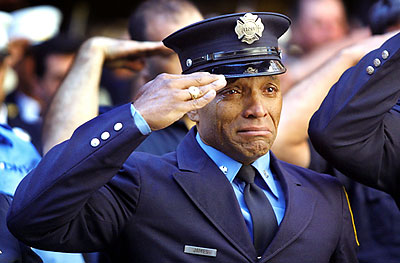



Greece, while the Nations of the World Stood With Us -You Stood Against Us.
We Will Never Forget.
Greek television was consumed by discussions over whether or not the United
States deserved this predicament due to its political and military policies
that have caused suffering to many people. Something strange happened after
Sept. 11 in both Greece and Turkey. Large groups within the two nations discovered
a great similarity which they do not want to admit openly - a satisfaction
with the horrorific tragedy that besets the United States. This twisted feeling
on one side was the making of the Greek political elite, who either cultivated
or tolerated anti-Americanism for their political careers. On the other side
of the Aegean Sea, a mixture of die-hard leftists with anti-American reflexes,
the religious right and nationalists that court racism found themselves on
the same front - enjoying the acts of violence directed against the United
States. The two countries are the only NATO members in which a sizable portion
of their population has expressed anti-American feelings following the Sept.
11 tragedy.
In addition, Greece is a member of the European Union, the standard bearer of 'Western civilization' that the terrorists have sworn to destroy. Similarly, opinion polls have revealed that two-thirds of both nations do not want the war on terrorism to be carried out in the form of bombing Afghanistan. A large number of Greeks go as far as disagreeing with the U.S. decision to attack the Taliban. The figures provided by a poll conducted a few days after Sept. 11, that was published in the Greek press (cited in a Wall Street Journal op ed entitled 'Is Greece a Western nation?' by Takis Michas Oct. 10, 2001), revealed that only 18.9 percent of the respondents said that they had positive feelings about the United States and its citizens. A separate poll revealed that 25 percent of respondents said they felt 'satisfied,' and believed that 'justice had been served.' Also, 30 percent of respondents said that the attacks were a justified reaction to U.S. policies. Only 10 percent of the respondents agreed with the view that Greece should cooperate with its NATO partners in a possible military campaign against states supporting terrorism and harboring terrorists. According to the same Wall Street Journal op ed, Mr. Takis Kafetzis, the political analyst who supervised the poll, claims that more than 40 percent of the respondents felt pleasure about what happened. The conclusion of Mr. Kafetzis is that 'Greece, simply does not share Western values and perceptions.' The same verdict is true to a great extent with a sizable proportion of the Turkish people who believe that somehow Americans are to blame for the terrorist attack because of their foreign policy, which has victimized many of the world's peoples.
However, unlike the Turkish director for administration of religious affairs, upon learning about the terrorist attack, the popular Archbishop Christodoulos of the Greek Orthodox Church stated that the terrorist act was the result of the 'injustice and inequality' that pervades the world. The media, too, joined in. On the Turkish side, the mainstream press sided with the United States, while the leftist and the religious press went as far as claiming that the evil attack on the Twin Towers and the Pentagon was the making of either the U.S. 'deep-state' (secret but powerful state actors or actors in the state) or was an Israeli plot. Reportedly, television broadcasting in Greece was consumed by discussions over whether or not the United States deserved this predicament due to its political and military policies that have caused suffering to many people.
While a Greek nongovernmental organization (NGO), the Center for New Policy Pavlos Bakoyannis, invited the citizens of Athens to participate in a memorial service for the victims of the terrorist attacks in the United States, only about 500 people turned up. Such services were held in Turkey only by state actors or by small-scale civic initiative. By contrast, 5,000 people participated in a communist-led demonstration in Athens denouncing the CIA for its role in the terrorist acts. On Sept. 13 fans of a Greek soccer club playing against a Scottish team tried to burn the U.S. flag before the start of the game and booed during a moment of silence which was called for the victims of the terrorist attacks in the United States.
Similar incidents of derision occurred in Turkey during soccer games when the spectators were called to observe a minute of silence to honor American victims in the first two weeks after the tragic incidents. While the right in Turkey was quite convinced that it was the State of Israel who wanted to provoke the United States against Muslims and Arabs, the Greeks were inclined to put the blame on Jews in general. Allegations that Jews were responsible for the Sept. 11 terrorist attacks were so prominent in sections of the Greek media that the Israeli Embassy took the unprecedented step of denouncing those allegations as 'criminal, racist, anti-Semitic propaganda resembling that of the Nazis.' Another generally held idea shared by the conspiracy theorists of both nations is that Usama bin Laden is the creation of the CIA. So the United States was the victim of its own design, hence, it deserves the consequences. The left on both sides of the Aegean Sea is inclined to see the tragic acts of terrorism as a form of anti-imperialist struggle against the United States, although they have no special sympathy for bin Laden or the Taliban. While Greeks on the whole feel that they are not threatened by terrorism but by the fight against terrorism, Turks think differently. In general, Turks feel that they have suffered enough from terrorism and that the West has not understood them. Countries like Greece have actively supported the terrorists of Turkey, while some others like Germany have been lenient to terrorists that threaten Turkey.
Therefore, fighting against international terrorism must be supported, provided that anyone else will better understand Turkey's anti-terrorist struggle and methods. However, when it comes to targeting Iraq as a rogue-state, that is something else. The Turkish establishment is suspect of U.S. designs of a post-Saddam Iraq from which a Kurdish state might emerge. This, they believe, might be the beginning of a process, which could dismantle Turkey. Needless to say, this is a defeatist attitude because thinking that the Kurds of Turkey might want to join an impoverished, land-locked tribal entity reflects a deep distrust of Turkey's ability to be a prosperous, democratic and multi-cultural country. Turkey can easily become one but not with the existing leadership that lacks this visionary quality. Considering that it is the same prime minister who refused to join Greece's drive to become a EU member in the 1970s, Turkey is in a disadvantage to move closer to European standards. But what about Greece? Although this country has been a EU member for the past decade, Greek nationalism has created a psychological rift with the United States in particular, and the West in general. Throughout the 1980s, the governing Pasok (socialist) Party led by Andreas Papandreou made it a focal point to challenge Western and especially U.S. policies. In return it has supported the Jaruzelski dictatorship in Poland, refused to condemn the suppression of dissidents in the Soviet Union, and harbored organizations declared as terrorist in the West and in Turkey, namely the Kurdistan Workers' Party (PKK). It also opposed the U.S. (Reagan) administration's deployment of cruise and Pershing missiles in Europe. After the collapse of communism in Eastern Europe, the political right also adopted anti-Americanism. American policies in Bosnia and Kosovo were widely seen as aiming to destroy Eastern Orthodoxy and Greece's influence in Eastern Europe.
That is why recent polls show that over 50 percent of Greek conservatives dislike the United States and its policies in the region. Similarly, attempts by the present government of Costas Simitis to decrease the influence of the church over politics and to secularize public life (as well as citizens' identity) were immediately attacked as being the plot of the 'Jewish lobby' in Washington. Oddly enough, the overthrow of Slobodan Milosevic that was celebrated all over the world, as well as in Yugoslavia itself, was seen as a sinister U.S. design. In short, nationalism, secular or religious, that is embraced by large sections of all political parties, has become identical with anti-U.S. or anti-Western sympathies as in the Turkish case. Although the leaders of Greece's two main parties and leaders of some of Turkey's sundry political parties have expressed their grief for the terrorist attacks and pledged their support for U.S. attempts to fight international terrorism, as the polls show, their ability to influence public opinion is limited. This may be overcome in Turkey more easily than Greece because foreign policy is an elite vocation and public opinion is seldom heeded. Yet, chauvinism and anti-Western and anti-U.S. feelings on both sides of the Aegean Sea must be acknowledged, thought that it may be embarrassing, and new generations must not be poisoned with the hatred of the 'others' with whom we are bound to share the world. Chauvinism is an instant food for the soul but leads to early political senility and reactionaryism, which does not allow the use of collective wisdom or common sense.